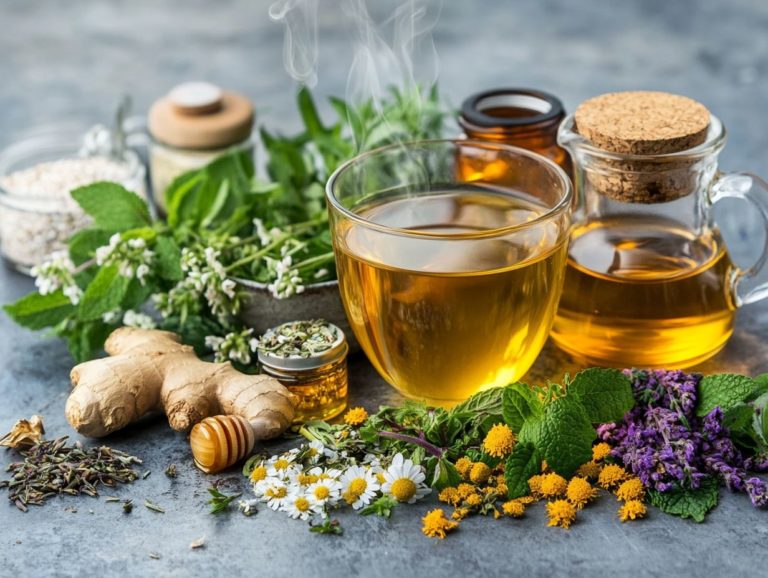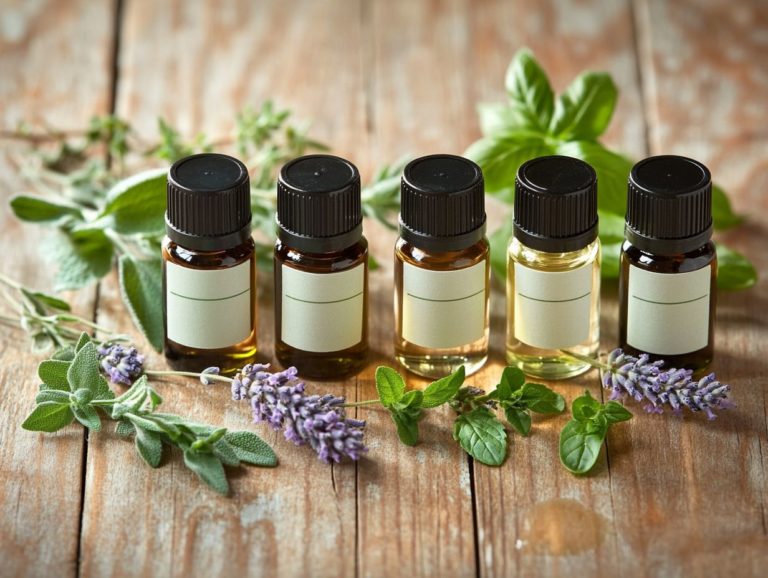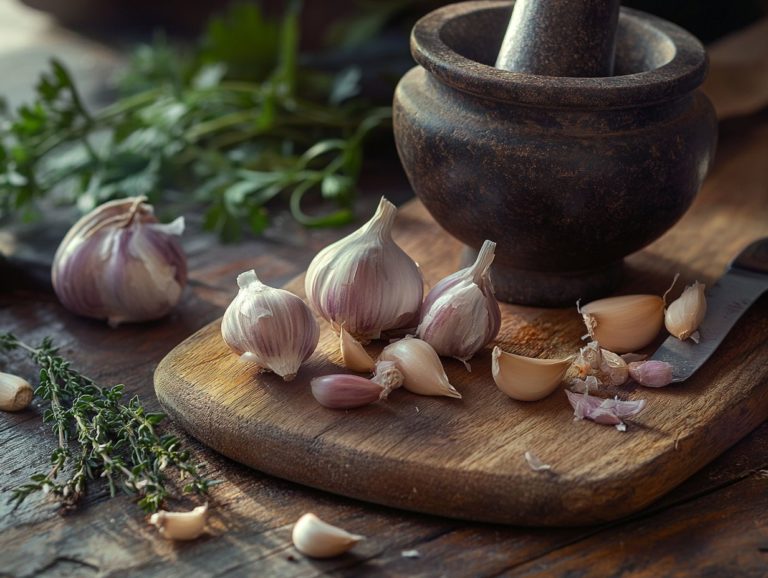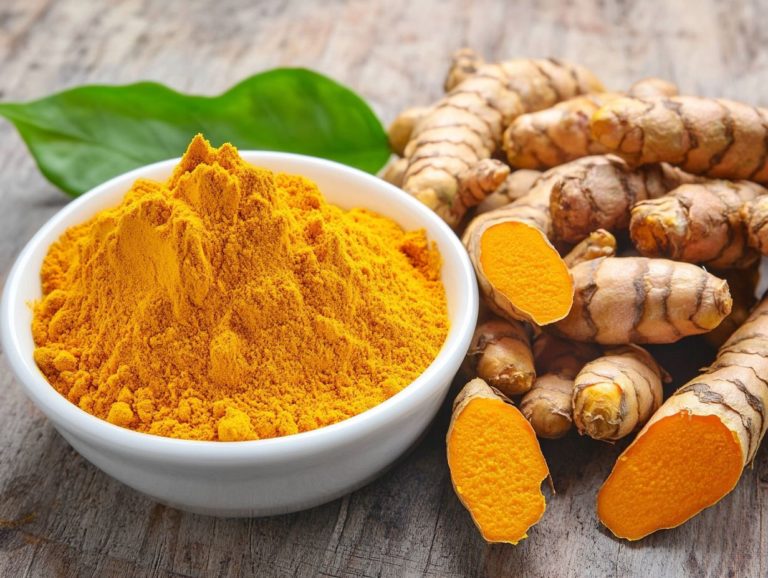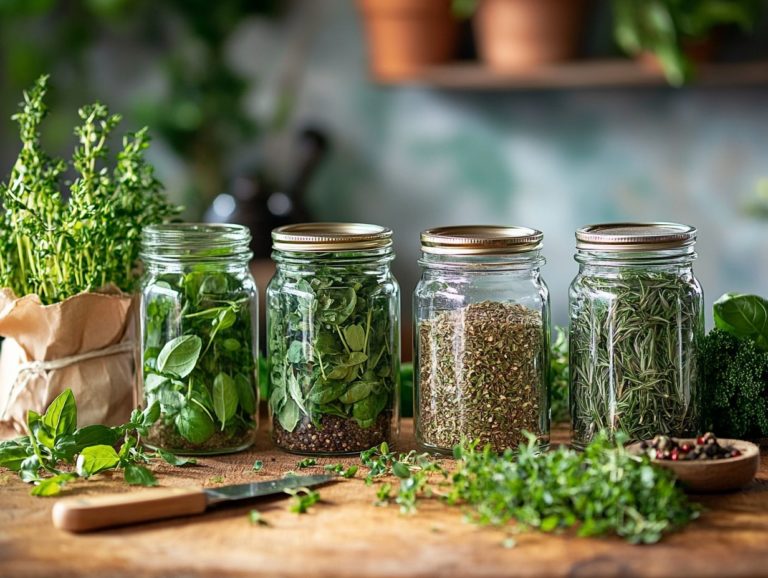How to Make a Herbal Tincture at Home
Herbal tinctures offer a powerful and convenient method to tap into the healing properties of plants.
Get ready to discover the amazing world of herbal tinctures! This article explores what herbal tinctures are, how to make them, and the many benefits they offer compared to other forms of herbal medicine.
You ll discover how to choose the right herbs and the essential supplies you ll need.
You ll also find a step-by-step guide to crafting your own tincture at home, complete with tips on storage and usage.
Whether you re a seasoned herbalist or just starting your journey, this guide will empower you with the knowledge to create and enjoy your very own herbal remedies.
Contents
- Key Takeaways:
- What is a Herbal Tincture?
- Benefits of Herbal Tinctures
- Choosing the Right Herbs for Your Tincture
- Supplies and Equipment Needed
- Step-by-Step Guide to Making a Herbal Tincture
- Storing and Using Your Herbal Tincture
- Frequently Asked Questions
- Understanding Herbal Tinctures: What They Are and Why You Should Make Them at Home
- What Ingredients Do I Need to Make a Herbal Tincture at Home?
- How Do I Choose Which Herbs to Use in My Tincture?
- What is the Process for Making a Herbal Tincture at Home?
- How Should I Consume My Homemade Herbal Tincture?
- How Long Can I Store My Herbal Tincture and How Do I Store It?
Key Takeaways:
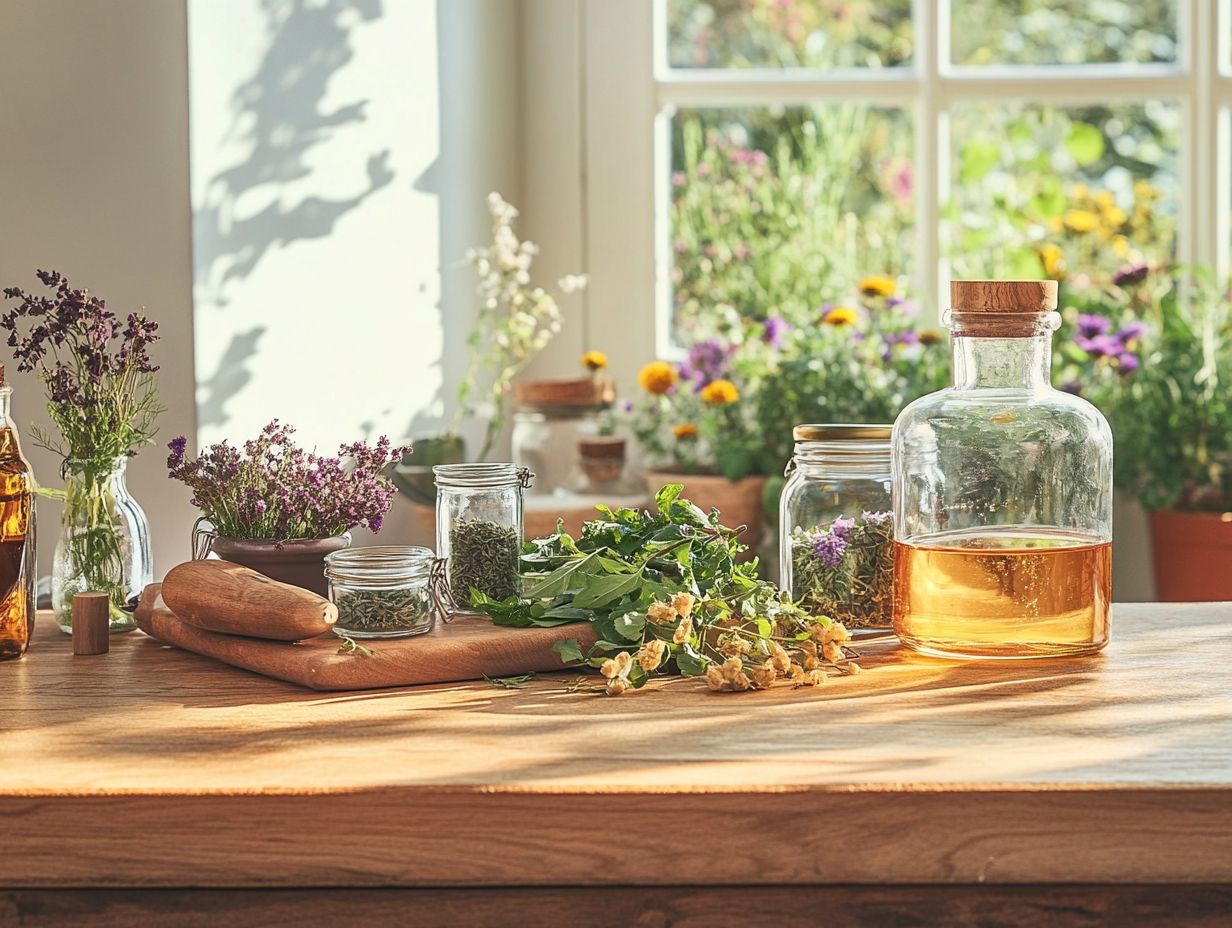
- Make your own herbal tincture to harness the full potential of natural remedies.
- Choose the right herbs and equipment, and follow a simple step-by-step guide for success.
- Proper storage and dosage are crucial for maximizing the benefits of your homemade tincture.
What is a Herbal Tincture?
Herbal tinctures are strong liquid extracts made from fresh or dried herbs. They use high-proof alcohol, like vodka or gin, to pull out the important parts of the plants. This extraction method preserves the beneficial properties of the herbs, resulting in potent remedies that are remarkably easy to administer.
For herbalists and natural health enthusiasts alike, herbal tinctures have become a favored choice, offering a convenient and effective way to seamlessly integrate the health benefits of various herbs into a holistic lifestyle.
Explanation of the Tincture Making Process
The art of making tinctures begins with thoughtfully selecting the right ingredients, whether that s fresh or dried herbs. Using high-proof alcohol, you extract their active components through various tincture extraction methods.
Start by assessing which herbs align with your therapeutic goals, as each one possesses unique properties and benefits. The choice of alcohol is equally important; options like vodka and gin not only influence the flavor but also impact the extraction efficiency.
For the best results, aim for an alcohol content between 40% and 60%. This ensures your tincture remains potent while effectively drawing out the herbs’ beneficial qualities. Such meticulous attention to detail transforms the tincture-making process into an art form, allowing you to create a rich palette of healthful elixirs.
Benefits of Herbal Tinctures
Herbal tinctures present a wealth of health benefits that often surpass those of other forms of herbal medicine, making them an exceptional choice for anyone in search of natural remedies for a range of ailments.
Advantages Over Other Forms of Herbal Medicine
When comparing herbal tinctures to other forms of herbal medicine, like capsules, teas, or powdered extracts, tinctures truly shine with their concentrated potency and user-friendly nature. This unique preparation method enables you to harness the full benefits of herbal ingredients, delivering powerful compounds directly into your bloodstream for rapid effects.
Another notable advantage of alcohol tinctures is their impressive shelf life, often outlasting other herbal preparations. This makes them an ideal choice for those who prefer to maintain a well-stocked herbal pantry. The high bioavailability is yet another asset; the alcohol serves as an excellent solvent, enhancing the extraction of beneficial plant constituents.
Adjusting the dosage of tinctures is a breeze, allowing you to tailor your intake according to your individual needs. With a plethora of tincture recipes to explore, you can create customized blends that align perfectly with your wellness journey.
Choosing the Right Herbs for Your Tincture
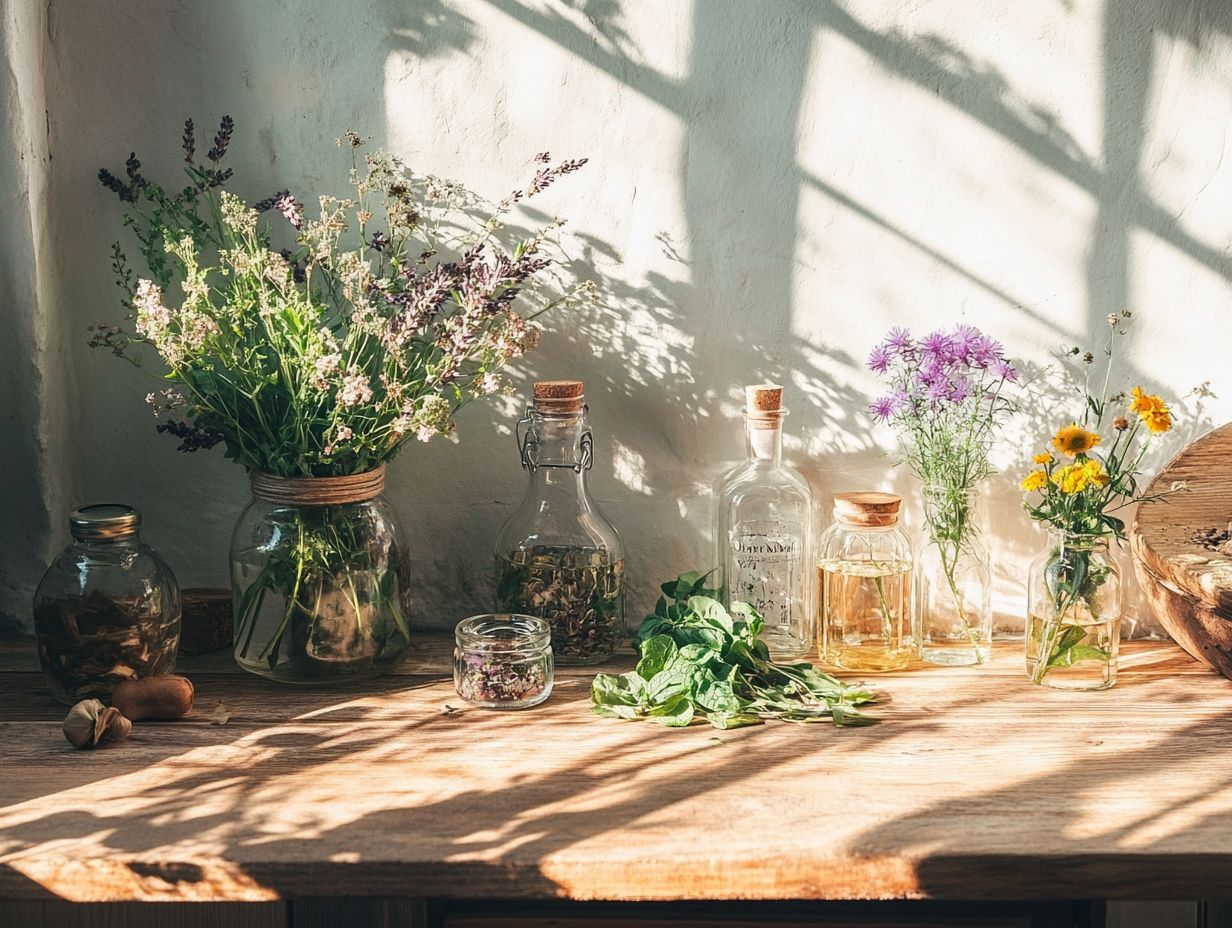
Choosing the right herbs for your tincture is essential for maximizing its health benefits and ensuring that it effectively addresses your specific needs.
Factors to Consider and Recommended Herbs
When you choose herbs for your tincture, consider the health benefits you want and how each herb releases its qualities. Find out how well they blend with other ingredients.
Understanding the unique strengths of various herbs can enhance your blending experience. For example, peppermint is loved for its refreshing flavor and helps soothe digestive issues while promoting relaxation.
Elderberry is a true powerhouse known for its immune-boosting abilities. It s essential to have in your herbal collection, especially during flu season.
St. John s wort is great for easing mild anxiety and depression. By combining these herbs, you can create powerful herbal extracts tailored to your wellness needs.
Supplies and Equipment Needed
To make your own homemade tinctures, you’ll need specific supplies and equipment. These will simplify the process and ensure you produce high-quality herbal extracts.
Essential Tools and Ingredients
Start with high-proof alcohol, glass jars, and fresh or dried herbs as your foundation. Don’t forget measuring cups for the right alcohol-to-herb ratio.
Strainers are also vital, as they help you achieve a smooth final product without plant debris.
Choose herbs based on the health benefits you seek. For instance:
- Lavender promotes relaxation.
- Ginger aids digestive health.
- Echinacea may support your immune system.
Using dried herbs often leads to better extraction, as they release their properties more effectively than fresh ones. This art and science of tincture-making lets you create a potent herbal elixir just for you.
Step-by-Step Guide to Making a Herbal Tincture
Making a herbal tincture from scratch is both enjoyable and rewarding. This easy step-by-step guide will help you through the entire process, ensuring optimal dosage and potency.
Instructions and Tips for Success
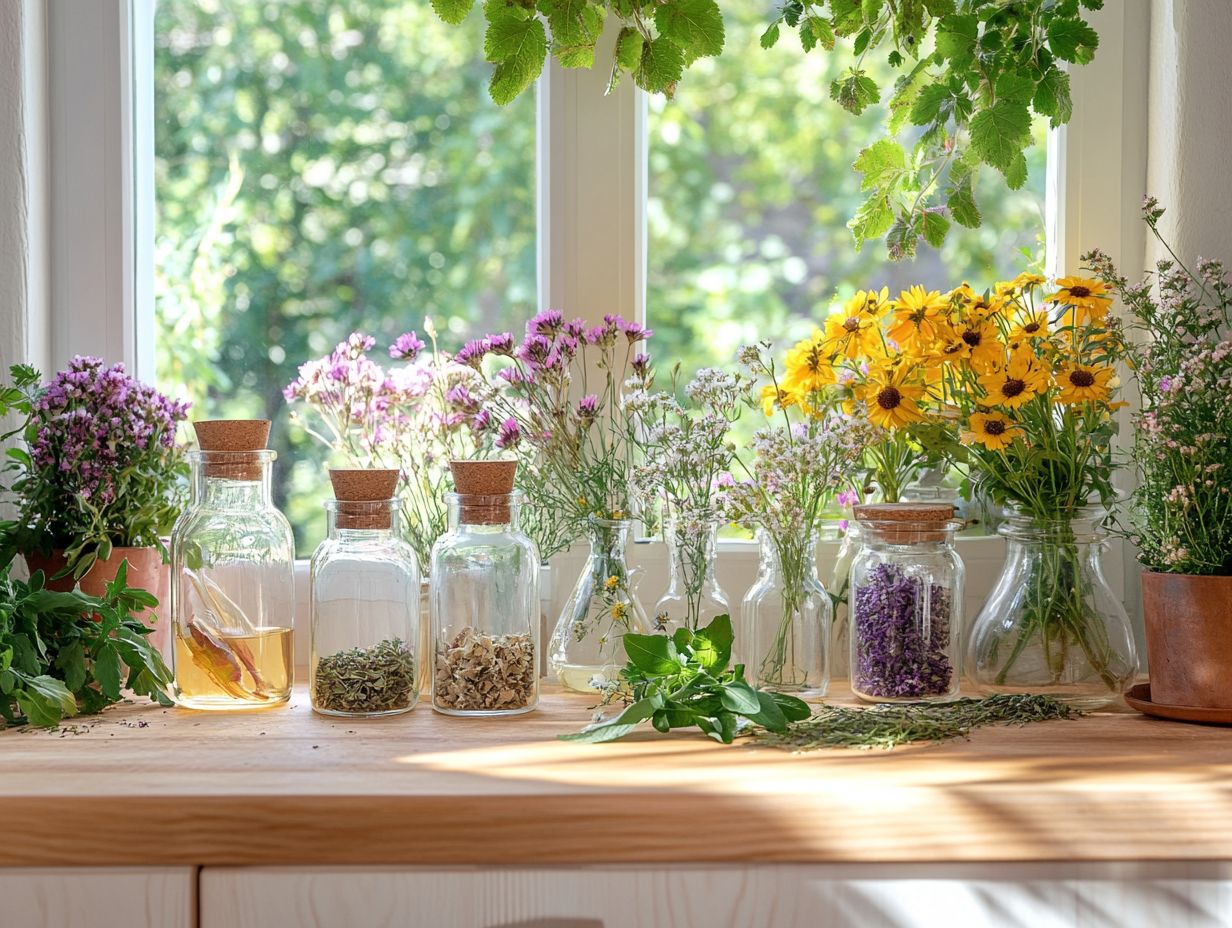
To succeed with your herbal tincture, follow a few specific instructions and tips. Start by selecting the right herbs and mastering the optimal extraction times.
For the best results, let your tincture steep for at least two weeks. This period helps extract valuable compounds.
Store tinctures in a cool, dark place to maintain their potency. Research the compatibility of herbs before combining them, as some work better together than others.
Storing and Using Your Herbal Tincture
Proper storage and usage of your herbal tincture are crucial for preserving its potency. With effective storage techniques and mindful dosage, your tincture will remain in peak condition.
Proper Storage Techniques and Dosage Recommendations
To truly maximize the effectiveness of your herbal tincture, mastering proper storage techniques is crucial. These directly impact both its shelf life and overall potency.
Opt for dark glass bottles. They are essential for shielding your tincture from damage from light, ensuring that the beneficial properties of the herbs remain intact over time. Store your tinctures in a cool, dark place far from direct sunlight and heat sources to enhance their longevity.
Regarding dosage, start small with just a few drops or milliliters. Adjust based on the type of tincture and your individual needs. Consider the specific herbal benefits that each tincture offers and consult relevant safety guidelines. This approach helps you achieve the desired effects while avoiding any adverse reactions.
Frequently Asked Questions
Understanding Herbal Tinctures: What They Are and Why You Should Make Them at Home
A herbal tincture is a concentrated liquid extract made from herbs. It is a convenient and effective way to consume medicinal herbs. Making it at home allows you to control the ingredients and the quality of the tincture.
What Ingredients Do I Need to Make a Herbal Tincture at Home?
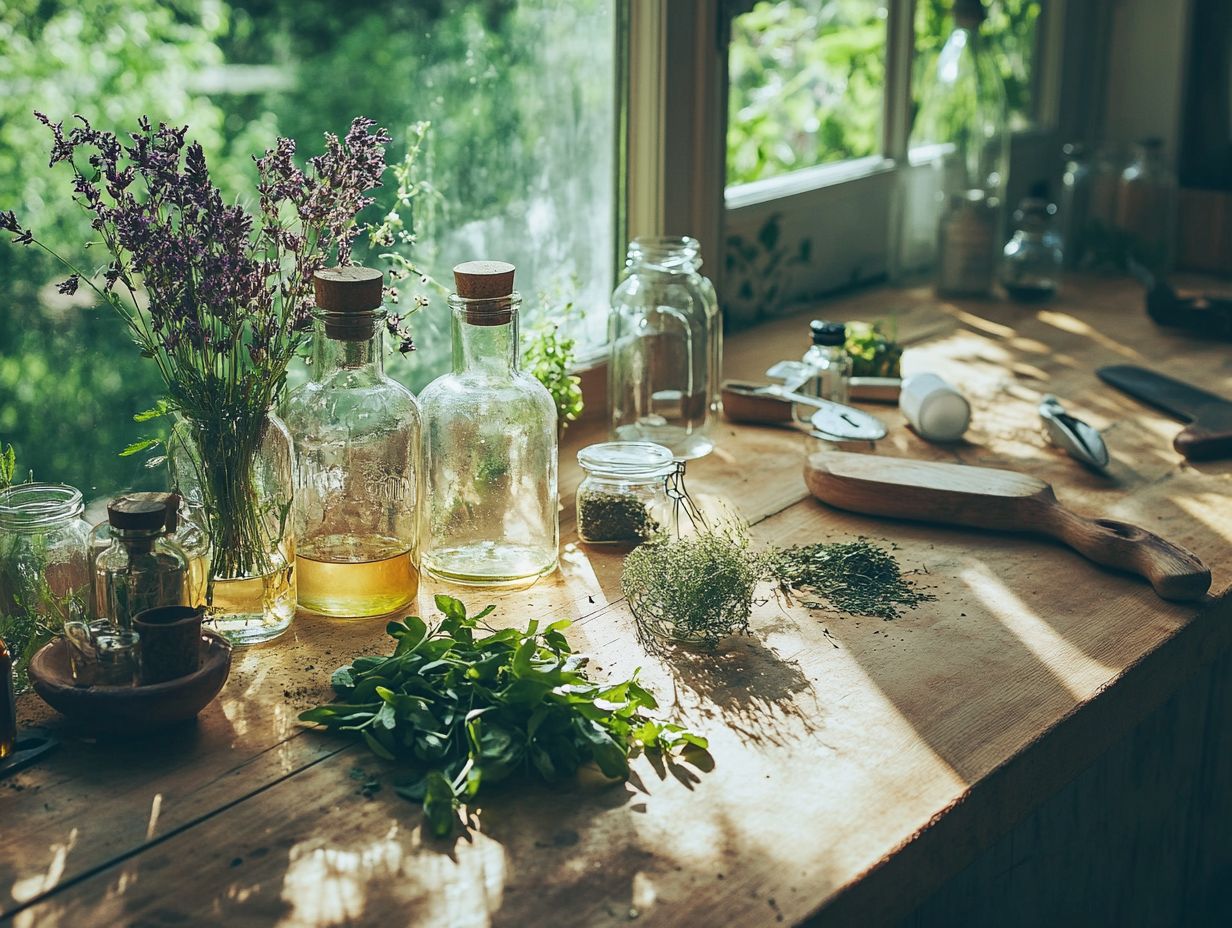
You will need:
- Dried or fresh herbs
- High-proof alcohol (like vodka or brandy)
- Glass jars with lids
- Strainer or cheesecloth
How Do I Choose Which Herbs to Use in My Tincture?
Choose herbs with medicinal properties that align with your needs. Research the benefits of different herbs and consult a herbalist if needed.
What is the Process for Making a Herbal Tincture at Home?
Start by placing your chosen herbs in a glass jar and covering them with alcohol. Let it sit for 4-6 weeks, shaking the jar daily. Then strain the liquid and store it in a dark glass bottle. Now, your homemade tincture is ready for you to enjoy!
How Should I Consume My Homemade Herbal Tincture?
You can take your tincture by adding a few drops to a glass of water or directly under your tongue. It is best to start with a small amount and gradually increase as needed.
How Long Can I Store My Herbal Tincture and How Do I Store It?
If stored properly in a cool, dark place, your tincture can last for several years. Make sure to label your bottle with the date and type of herb used. You can also store it in the fridge for longer shelf life.

